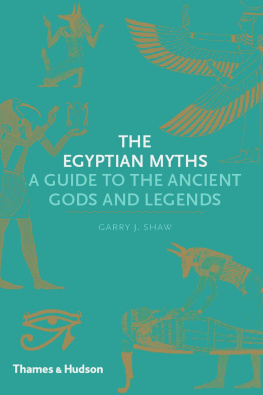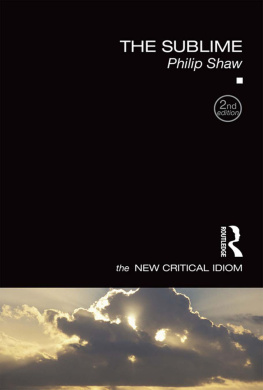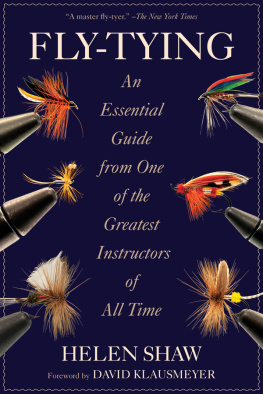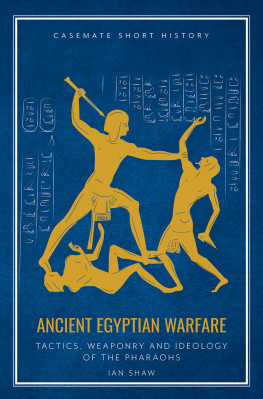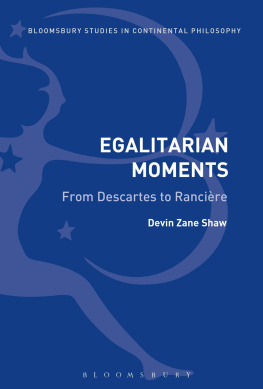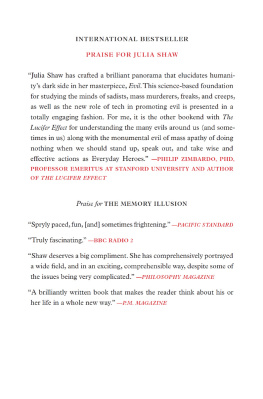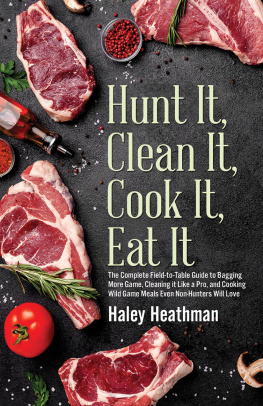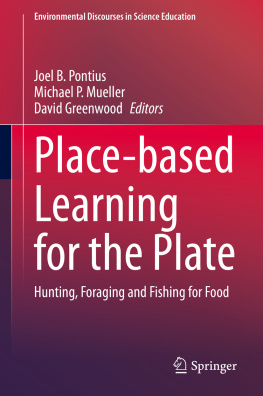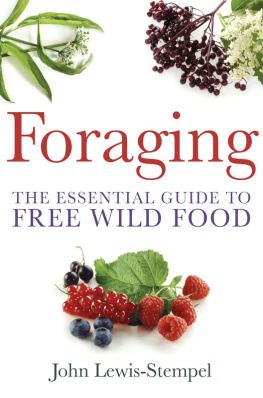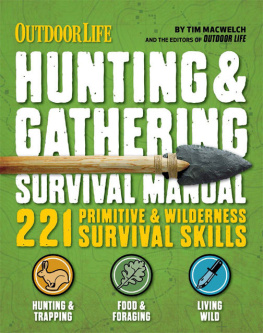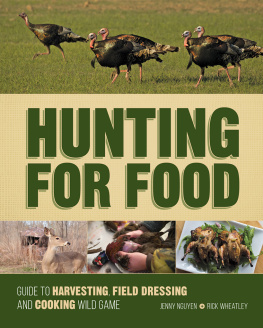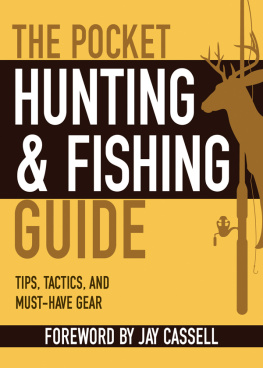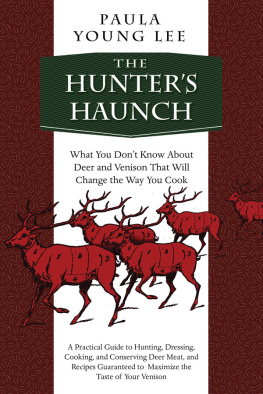

To Mom and Dad,
who showed me the way and taught me
that all things are possible.
CONTENTS
PART I:
F ORAGING FROM C OAST TO C OAST
PART II :
F ISHING AND F EASTING FROM S TREAMS TO THE S EA
PART III:
H UNTING FOR F OOD AND F ULFILLMENT
INTRODUCTION
We live in an edible world. Its all around us, if you look closely. You can see it in lawns and at the beach. It thrives along every river, on hillsides, and deep in swamps. You can even steal glimpses of it growing between the cracks of abandoned parking lots and on untended mounds of earth forgotten long ago by construction crews. Natures garden grows, yes, but it also flies through the air, runs through the brush, and swims through the water.
Most have forgotten the feast that lives all around us. Many stalk the supermarket aisles searching, not for real, honest food, but for the latest flavor of frozen dinner or convenience food. Our hunting and gathering is now largely restricted to picking through the produce aisle for the best ear of corn or keeping an eagles eye out for so-called bargains. But our instincts are strong. Weve been hunters and gatherers eons longer than weve been farmers. Esau is far older than Jacob. Who among even the most urban of us has not eyed a ripe blackberry with interest, even lust, while walking along a path on a hot summers day? I live in a county of nearly two million people, many of whom run, walk, or ride our local bike trail every day. On that trail, I can be assured that much of what I forage for during the year will remain untouched and unnoticed by these masses. But not the blackberry. As soon as they ripen in July, they are gorged upon by passersby. It is the gatherer in us trying to escape.
What stops the blackberry pickers from enjoying the miners lettuce, mushrooms, or acorns that surround the bramble? Innocent ignorance and a healthy fear of the unknown. But recognizing wild plants, fish, and animals is no different than recognizing the difference between a head of lettuce and a head of cabbage, or the difference between a deer and a horse. If you can pick a blackberry, you can pick other berries. Or dandelions. Digging clams is not such a stretch, nor is fishing. And for many, with fishing comes huntingthe quest for the original free-range, organic meat does not stop at the waters edge.
I am not content to merely be a spectator in nature. I feel compelled to play the part humans were born to play. Gathering acorns. Picking berries. Digging clams. Hunting birds. These are active pursuits that bring me closer to nature and make me deeply aware that we are all part of the natural world. We cannot live outside nature, as estranged as we may feel sometimes, living in cities or subdivisions. The natural world is not a museum, filled with exhibits to be looked at but never touched. It is our home.
Ive felt this need to be outside ever since I was a toddler. I am blessed with a father who gave me an overabundance of curiosity, a mother who gave me a love of the outdoors, and sisters who encouraged this from an early age. My mother taught me to fish, and some of my familys finest hours have been digging clams, fishing for stripers, and feasting at the table afterward.
As I grew older, I realized that most people werent like us. Most people couldnt name any of the plants or animals they saw around them. My father can name every bird within a hundred miles of his house, and my mother made sure there were encyclopedias of natural history on our bookshelves, set low enough so a grade-school kid could reach them. This sort of knowledge is real power. When I walk anywhere, even in cities, my eyes automatically catalog the plants and animals around me: Thats a walnut tree. Those are dandelions. Ooh, mourning doves! Wonder if there are crayfish in that stream? Look at thata giant prickly pear that no ones tending. Someone once said that you have to really want to starve to death in the wilderness, because food is all around you. Knowing your plants and animals can mean life or death.
I want you to have that knowledge. This is why I wrote the book you are holding now. Knowing your plants and animals, learning to forage and fish and hunt, and then understanding what to do with what you have found is, for many, a deeply spiritual experience. It is for me, and for every hunter, angler, and forager I know. Once you acquire this knowledge, you may feel the same way.
What is it you will see, out there in the wild world? Youll witness things while hunting or fishing or foraging you will never experience any other way. A forager must walk off the beaten path. An angler never knows what shell reel in. A hunter must become invisible and silent. This is why we all have so many stories. The world is endlessly fascinatingits better than the best nature show youve ever seen. You can smell it, taste it, feel it on your skin and in your hands. As your skills strengthen, you also will begin to notice something in yourself you only dimly knew existed: You will start feeling more like a complete human, capable of foraging for supper, fishing for breakfast, and hunting for the long winter ahead. You will know how to cure meats, make foods from scratch you thought only came in boxes, and make your own wine to wash it all down with. That feeling is you emerging from your secondhand existence, like a fawn taking its first steps.
I am not asking you to forgo the supermarket. I go there every week, largely for flour, sugar, dairy products, and beer. No, I dont make my own beer. Yet. While this book focuses on fishing, foraging, and hunting skills, it also will help you learn how to make more of your meals from basic ingredients, not prepackaged foods. Honest food need not be wild, but it must be made by hand and with love.
I want to help you become a more active participant in the food you eat, the food you feed your family and friends. For the most part, that food does not come ready to eat. It doesnt have a shiny label and wasnt raised on a factory farm or subjected to genetic modification. It is, as author Michael Pollan puts it, food your grandmother, or really your great-grandmother, would recognize. Our grandparents and great-grandparents knew many of the skills in this book. Its time we relearned them. The basic act of knowing how to find your own food, to feed yourself with a meal you didnt buy, is a small act of freedom in an increasingly regimented and mechanical world.
What, you may ask, is the big deal with wild food? For starters, wild food lived by its own devices. It was not fed a strict diet of anything. It was not fed. It fed itself. It is free from our dubious husbandry and, in most cases, is the better for it. Wild plants such as lambs-quarters or amaranth are so full of vitamins they make spinach look like a Twinkie. Wild fish are universally recognized by eaters and experts alike as tastier than those reared by aquaculture. Why is it that wild salmon, rather than their pale farmed cousins, are so sought after? Taste. Wild game is not legal to sell in the United States, but those privileged enough to eat it know that, when properly prepared, it is infinitely more savory than its domestic counterparts. Anyone who has eaten both domestic duck and a fat mallard from the marshes knows this as a matter of faith. It is also my firm belief that the more diverse our diets are, the healthier we will be. Introducing wild food to your diet goes a long way toward achieving this goal.
Hunting occupies a full third of this book, and it is for good reason. Hunting is a pursuit utterly opaque to those not raised around it, and many of us who did grow up around hunters often remember those who set a bad example rather than a good one. This is a pity, because
Next page

